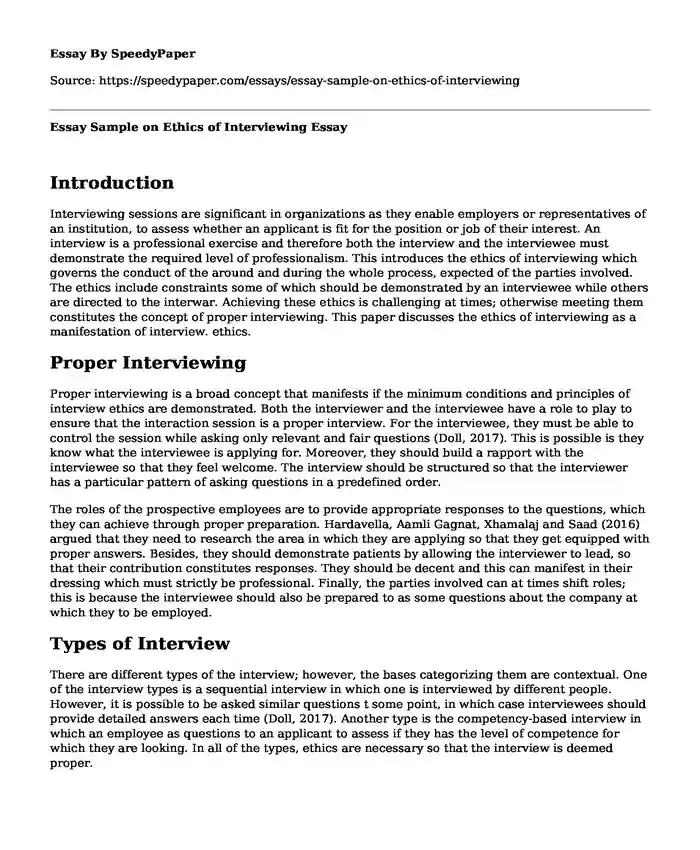
| Type of paper: | Essay |
| Categories: | Human resources |
| Pages: | 3 |
| Wordcount: | 648 words |
Introduction
Interviewing sessions are significant in organizations as they enable employers or representatives of an institution, to assess whether an applicant is fit for the position or job of their interest. An interview is a professional exercise and therefore both the interview and the interviewee must demonstrate the required level of professionalism. This introduces the ethics of interviewing which governs the conduct of the around and during the whole process, expected of the parties involved. The ethics include constraints some of which should be demonstrated by an interviewee while others are directed to the interwar. Achieving these ethics is challenging at times; otherwise meeting them constitutes the concept of proper interviewing. This paper discusses the ethics of interviewing as a manifestation of interview. ethics.
Proper Interviewing
Proper interviewing is a broad concept that manifests if the minimum conditions and principles of interview ethics are demonstrated. Both the interviewer and the interviewee have a role to play to ensure that the interaction session is a proper interview. For the interviewee, they must be able to control the session while asking only relevant and fair questions (Doll, 2017). This is possible is they know what the interviewee is applying for. Moreover, they should build a rapport with the interviewee so that they feel welcome. The interview should be structured so that the interviewer has a particular pattern of asking questions in a predefined order.
The roles of the prospective employees are to provide appropriate responses to the questions, which they can achieve through proper preparation. Hardavella, Aamli Gagnat, Xhamalaj and Saad (2016) argued that they need to research the area in which they are applying so that they get equipped with proper answers. Besides, they should demonstrate patients by allowing the interviewer to lead, so that their contribution constitutes responses. They should be decent and this can manifest in their dressing which must strictly be professional. Finally, the parties involved can at times shift roles; this is because the interviewee should also be prepared to as some questions about the company at which they to be employed.
Types of Interview
There are different types of the interview; however, the bases categorizing them are contextual. One of the interview types is a sequential interview in which one is interviewed by different people. However, it is possible to be asked similar questions t some point, in which case interviewees should provide detailed answers each time (Doll, 2017). Another type is the competency-based interview in which an employee as questions to an applicant to assess if they has the level of competence for which they are looking. In all of the types, ethics are necessary so that the interview is deemed proper.
Personal Experience
I had been in an interview when I had not learned some of the important ethics; however, in the end, I developed sufficient skills to apply in the future. I demonstrated some of the ethical manifestations I learned before and averagely I managed a great level of interaction. However, I failed to realize that an interview is a two-way traffic conversation; I did not ask any questions until the session ended. Nevertheless, I succeeded because all my responses and appearance demonstrated ethical desired constraints.
Conclusion
Ethical interviewing is significant in the context of the assessment of the competence of an applicant for the position of their desire. This is important because employers are looking for employees who will deliver quality in their organization. On the same note, the ethical constraints are a way of the professional way of elimination when there are several applicants. The demonstration of ethics is an obligation to both the interviewer and the interviewer to make it a proper interview.
References
Doll, J. (2017). Structured interviews: developing interviewing skills in human resource management courses. Management Teaching Review, 3(1), 46-61. DOI: 10.1177/2379298117722520
Hardavella, G., Aamli Gagnat, A., Xhamalaj, D., & Saad, N. (2016). How to prepare for an interview. Breathe, 12(3), e86-e90. DOI: 10.1183/20734735.013716
Cite this page
Essay Sample on Ethics of Interviewing. (2023, Apr 01). Retrieved from https://speedypaper.net/essays/essay-sample-on-ethics-of-interviewing
Request Removal
If you are the original author of this essay and no longer wish to have it published on the SpeedyPaper website, please click below to request its removal:
- Causes of Bullying in Our Free Essay
- Accounting Essay Sample on Valuing Companies with Assets That Are Said to Be Intangible
- Free Essay in Organizational Theory and Design: Air Canada
- Pathophysiology of CVI and DVT
- Essay Sample on Economics: Russia and Saudi Arabia
- Essay Example on Technology: Nest Smart Learning Thermostat
- Paper Example: Sustainable development and Globalization
Popular categories




